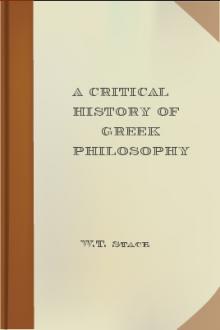A Critical History of Greek Philosophy by W. T. Stace (the false prince series .txt) 📕

- Author: W. T. Stace
- Performer: -
Book online «A Critical History of Greek Philosophy by W. T. Stace (the false prince series .txt) 📕». Author W. T. Stace
Hand in hand with the rise of democracy went the decay of religion. Belief in the gods was almost everywhere discredited. This was partly due to the moral worthlessness of the Greek religion itself. Any action, however scandalous or disgraceful, could be justified by the examples of the gods themselves as related by the poets and mythologers of Greece. But, in greater measure, the collapse of religion was due to that advance of science and philosophy which we have been considering in these lectures. The universal tendency of that philosophy was to find natural causes for what had hitherto been ascribed to the action of the divine powers, and this could not but have an undermining effect upon popular {108} belief. Nearly all the philosophers had been secretly, and many of them openly, antagonistic to the people's religion. The attack was begun by Xenophanes; Heracleitus carried it on; and lastly Democritus had attempted to explain belief in the gods as being caused by fear of gigantic terrestrial and astronomical phenomena. No educated man any longer believed in divination, auguries, and miracles. A wave of rationalism and scepticism passed over the Greek people. The age became one of negative, critical, and destructive thought. Democracy had undermined the old aristocratic institutions of the State, and science had undermined religious orthodoxy. With the downfall of these two pillars of things established, all else went too. All morality, all custom, all authority, all tradition, were criticised and rejected. What was regarded with awe and pious veneration by their fore-fathers the modern Greeks now looked upon as fit subjects for jest and mockery. Every restraint of custom, law, or morality, was resented as an unwarrantable restriction upon the natural impulses of man. What alone remained when these were thrust aside were the lust, avarice, and self-will of the individual.
The teaching of the Sophists was merely a translation into theoretical propositions of these practical tendencies of the period. The Sophists were the children of their time, and the interpreters of their age. Their philosophical teachings were simply the crystallization of the impulses which governed the life of the people into abstract principles and maxims.
Who and what were the Sophists? In the first place, they were not a school of philosophers. They are not to be compared, for example, with the Pythagoreans or {109} Eleatics. They had not, as a school has, any system of philosophy held in common by them all. None of them constructed systems of thought. They had in common only certain loose tendencies of thought. Nor were they, as we understand the members of a school to be, in any close personal association with one another. They were a professional class rather than a school, and as such they were scattered over Greece, and nourished among themselves the usual professional rivalries. They were professional teachers and educators. The rise of the Sophists was due to the growing demand for popular education, which was partly a genuine demand for light and knowledge, but was mostly a desire for such spurious learning as would lead to worldly, and especially political, success. The triumph of democracy had brought it about that political careers were now open to the masses who had hitherto been wholly shut out from them. Any man could rise to the highest positions in the State, if he were endowed with cleverness, ready speech, whereby to sway the passions of the mob, and a sufficient equipment in the way of education. Hence the demand arose for such an education as would enable the ordinary man to carve out a political career for himself. It was this demand which the Sophists undertook to satisfy. They wandered about Greece from place to place, they gave lectures, they took pupils, they entered into disputations. For these services they exacted large fees. They were the first in Greece to take fees for the teaching of wisdom. There was nothing disgraceful in this in itself, but it had never been customary. The wise men of Greece had never accepted any payment for their wisdom. Socrates, who never accepted any payment, {110} but gave his wisdom freely to all who sought it, somewhat proudly contrasted himself with the Sophists in this respect.
The Sophists were not, technically speaking, philosophers. They did not specialise in the problems of philosophy. Their tendencies were purely practical. They taught any subject whatever for the teaching of which there was a popular demand. For example, Protagoras undertook to impart to his pupils the principles of success as a politician or as a private citizen. Gorgias taught rhetoric and politics, Prodicus grammar and etymology, Hippias history, mathematics and physics. In consequence of this practical tendency of the Sophists we hear of no attempts among them to solve the problem of the origin of nature, or the character of the ultimate reality. The Sophists have been described as teachers of virtue, and the description is correct, provided that the word virtue is understood in its Greek sense, which did not restrict it to morality alone. For the Greeks, it meant the capacity of a person successfully to perform his functions in the State. Thus the virtue of a mechanic is to understand machinery, the virtue of a physician to cure the sick, the virtue of a horse trainer the ability to train horses. The Sophists undertook to train men to virtue in this sense, to make them successful citizens and members of the State.
But the most popular career for a Greek of ability at the time was the political, which offered the attraction of high positions in the State. And for this career what was above all necessary was eloquence, or if that were unattainable, at least ready speech, the ability to argue, to meet every point as it arose, if not with sound {111} reasoning, then with quick repartee. Hence the Sophists very largely concentrated their energies upon the teaching of rhetoric. In itself this was good. They were the first to direct attention to the science of rhetoric, of which they may be considered the founders. But their rhetoric also had its bad side, which indeed, soon became its only side. The aims of the young politicians whom they trained were, not to seek out the truth for its own sake, but merely to persuade the multitude of whatever they wished them to believe. Consequently the Sophists, like lawyers, not caring for the truth of the matter, undertook to provide a stock of arguments on any subject, or to prove any proposition. They boasted of their ability to make the worse appear the better reason, to prove that black is white. Some of them, like Gorgias, asserted that it was not necessary to have any knowledge of a subject to give satisfactory replies as regards it. And Gorgias ostentatiously undertook to answer any question on any subject instantly and without consideration. To attain these ends mere quibbling, and the scoring of verbal points, were employed. Hence our word "sophistry." The Sophists, in this way, endeavoured to entangle, entrap, and confuse their opponents, and even, if this were not possible, to beat them down by mere violence and noise. They sought also to dazzle by means of strange or flowery metaphors, by unusual figures of speech, by epigrams and paradoxes, and in general by being clever and smart, rather than earnest and truthful. When a man is young he is often dazzled by brilliance and cleverness, by paradox and epigram, but as he grows older he learns to discount these things and to care chiefly for the substance and {112} truth of what is said. And the Greeks were a young people. They loved clever sayings. And this it is which accounts for the toleration which they extended even to the most patent absurdities of the Sophists. The modern question whether a man has ceased beating his wife is not more childish than many of the rhetorical devices of the Sophists, and is indeed characteristic of the methods of the more extravagant among them.
The earliest known Sophist is Protagoras. He was born at Abdera, about 480 B.C. He wandered up and down Greece, and settled for some time at Athens. At Athens, however, he was charged with impiety and atheism. This was on account of a book written by him on the subject of the gods, which began with the words, "As for the gods, I am unable to say whether they exist or whether they do not exist." The book was publicly burnt, and Protagoras had to fly from Athens. He fled to Sicily, but was drowned on the way about the year 410 B.C.
Protagoras was the author of the famous saying, "Man is the measure of all things; of what is, that it is; of what is not, that it is not." Now this saying puts in a nutshell, so to speak, the whole teaching of Protagoras. And, indeed, it contains in germ the entire thought of the Sophists. It is well, therefore, that we should fully understand exactly what it means. The earlier Greek philosophers had made a clear distinction between sense and thought, between perception and reason, and had believed that the truth is to be found, not by the senses, but by reason. The Eleatics had been the first to emphasize this distinction. The ultimate reality of {113} things, they said, is pure Being, which is known only through reason; it is the senses which delude us with a show of becoming. Heracleitus had likewise affirmed that the truth, which was, for him, the law of becoming, is known by thought, and that it is the senses which delude us with a show of permanence. Even Democritus believed that true being, that is, material atoms, are so small that the senses cannot perceive them, and only reason is aware of their existence. Now the teaching of Protagoras really rests fundamentally upon the denying and confusing of this distinction. If we are to see this, we must first of all understand that reason is the universal, sensation the particular, element in man. In the first place, reason is communicable, sensation incommunicable. My sensations and feelings are personal to myself, and cannot be imparted to other people. For example, no one can communicate the sensation of redness to a colour-blind man, who has not already experienced it. But a thought, or rational idea, can be communicated to any rational being. Now suppose the question is whether the angles at the base of an isosceles triangle are equal. We may approach the problem in two ways. We may appeal either to the senses or to reason. If we appeal to the senses, one man will come forward and say that to him the angles look equal. Another man will say that one angle looks bigger than the other, and so on. But if, like Euclid, we appeal to reason, then it can be proved that the two angles are equal, and there is no room left for mere personal impressions, because reason is a





Comments (0)